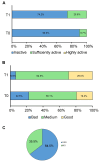Lifestyle Intervention Improves Metabolic Dysfunction-Associated Steatotic Liver Disease in Children with Down Syndrome
- PMID: 40732956
- PMCID: PMC12299393
- DOI: 10.3390/nu17142331
Lifestyle Intervention Improves Metabolic Dysfunction-Associated Steatotic Liver Disease in Children with Down Syndrome
Abstract
Background/Objectives: We evaluated the efficacy of a good lifestyle intervention on the severity of metabolic dysfunction-associated steatotic liver disease (MASLD) in children with Down syndrome (DS). Methods: This retrospective longitudinal study included 31 children with Down syndrome (DS) who were affected by MASLD and attended nutritional counseling based on a nutritional approach (e.g., Mediterranean diet and antioxidant supplements), as well as physical exercise. Clinical parameters, markers of low-grade systemic inflammation, and hepatic steatosis, as assessed by ultrasound, were evaluated at baseline (T0) and after 6 months (T1). Results: Several anthropometric and biochemical parameters, including body mass index, waist circumference, diastolic and systolic blood pressure, aspartate aminotransferase, basal insulin, insulin resistance, pro-inflammatory interleukin-1β, and anti-inflammatory interleukin-10, showed significant improvement after 6 months of a nutritional approach. This study also found a regression of at least one grade of hepatic steatosis in a significant portion of patients, especially in those who received antioxidant supplements. Conclusions: Our study further supports the hypothesis that a healthy lifestyle intervention, based on adherence to the Mediterranean diet, natural supplements with antioxidant properties, and regular physical activity, can be considered a safe therapeutic approach for reducing the risk and severity of MASLD in children with DS.
Keywords: MASLD; antioxidants; cytokines; down syndrome; mediterranean diet.
Conflict of interest statement
The authors declare no conflicts of interest.
Figures


References
-
- Capone G.T., Chicoine B., Bulova P., Stephens M., Hart S., Crissman B., Videlefsky A., Myers K., Roizen N., Esbensen A., et al. Co-occurring medical conditions in adults with Down syndrome: A systematic review toward the development of health care guidelines. Am. J. Med. Genet. Part A. 2018;176:116–133. doi: 10.1002/ajmg.a.38512. - DOI - PubMed
MeSH terms
Substances
Grants and funding
LinkOut - more resources
Full Text Sources
Medical

